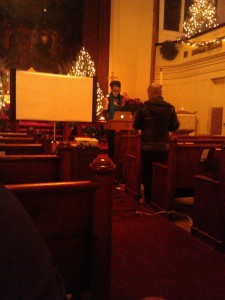
So, I did. And I enjoyed it.
The talk was part of a Project Connect retreat called “Listen! God is calling!” A handful of young adults thinking about church leadership were in attendance. Even though it wasn’t well advertised by our synod, the audience included that handful, and roughly fifty seminary students, pastors, high school students, and me. And, like all good church congregations, I sat by myself in the second row. But that was a-ok with me. I wanted to not be distracted by the hair of anyone in front of me.
I was hoping that Rev. Nadia would tell her story – and she did. She did a great job with “I” statements – this was her story, not “our” story. It was a story of her journey, her church, her experience of the law and gospel. I swore I heard a little Dr. Wengert in her when she kept saying that she’s willing to be thrown infront of the bus of law – and just how awesome Lutheran theology, and God’s grace, is. I’m glad she mentioned that because I’m with her on that one. We, as a church, need to do a better job at tooting our own horn. The Lutheran perspective is awesome. More than awesome, really. And it should be shouted from the freakin’ rooftops.
But scattered throughout her talk, panel response, and Q&A, were tidbits of data and theories that I wrote down. The fact that her church is only 4.5 years is important to note – and that they’re hoping to be self-funding in 18 months. The idea of shared leadership in the liturgy, democratizing the space, and a pro-participation model towards liturgy has helped her church. Her church is a place that can hold pain and, yet, express and experience carnival within the gathering. And her church is rooted in a model of authority where authority is shared and given. I don’t think this would work in all churches but it was neat to see how it worked in her community. I also thought it was neat that she shared her experience that, as a church planter, how she goes, the church goes. If she’s anxious, the church is anxious. If she’s great, the church is great. And it tied into something she’s been talking with her intern about – the notion of holding “space” for the congregation.
This is something I experienced when I presided for the first time. And, really, it is different than preaching, surprisingly. By being the focal point of the congregation, I, in many ways, found myself holding their space. I held whatever they brought to church that day: their certainties, their love, joys, pains, sufferings, doubts – and even their distractions as they checked their email on their iPhones in the middle of the sermon. And I’m sure since I actually believe that the ritual I’m participating in is worth something, that the breaking of bread, the singing of songs, the hearing of scripture, and the fellowship with one another – we are not only being the church but we are having faith, and gospel, done at us – I felt a spiritual, physical, and emotional weight just holding all that energy in that place. And I think it’s different being an intern and holding that space and being a called pastor. A called pastor is put into that place by the congregation. The congregation is giving that pastor that authority and responsibility to hold that space. For an intern, like me, I’m not called by the congregation to be in that space. I’m given the opportunity to learn and experiment with what it means to hold that space. As much as I enjoyed it, I was a partial interloper to that experience. It was a temporary jump into that space – a jump with a time limit. It’s possible, and I have no evidence to back this up, that ordination by the church – an external call and the giving of the stole – actually helps shore up the individual to hold that space that they are called to hold. Without that external call, that external promise through the church, and without the help of God, this holding of space…well..the weight of it all, week after week, would just plain be unbearable.
I’m glad I saw her and I’m glad she’s part of the church. I’m glad for all the work she’s done. And I’m glad that not only does she turn off certain aspects of the church (she’s punk rock, what what), I’m glad that she, at least, proclaims a story that is big enough to not be limited to who she is. In the ELCA, she has a lot of hype. Her church is big news. Her church is sexy. She, herself, is exotic, in the not-your-typical-Lutheran, way. But her story isn’t the only story – even if our current church promotion seems to act like her story, and other churches like hers, are the wave of the future/the only way the ELCA will survive/death to all who are not similar, etc etc. I hope everyone in the audience took to heart her story as an example of how our stories can actually breathe life into the capital C Church. Because if we’re unwilling to share our stories, why should we expect anyone to actually listen to the Story?